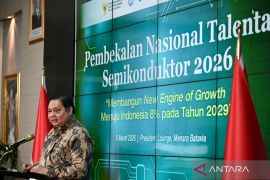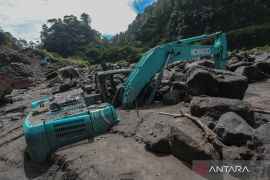The death of this ill-fated sperm whale (Physeter macrocephalus), which washed ashore in Kapota Isle, Wakatobi District, Southeast Sulawesi Province, on November 19, 2018, had been in the spotlight of so many mainstream media within and outside the country.
This environmental tragedy, which has been widely published and broadcast by the world`s reputable news media, such as Associated Press, CNN, The Guardian, and National Geographic, reveals that plastic waste has become a serious menace for Indonesia.
The marine debris has not just threatened the lives of Indonesia`s marine life but it has also tarnished the image of its tourism industry.
In February 2016, Kuta Beach in the Indonesian resort island of Bali, for instance, had come under the glare of the local and global media for the varied trash washed up ashore this popular beach.
The image of unclean Kuta Beach was published by many print and electronic media, including "theconversation.com," which used the photograph for an article written by Thomas Wright, a PhD student of Australia`s University of Queensland, dated 5/9/2017.
Wright pointed out that Indonesia was recorded as one of the world`s main contributors to marine plastic pollution due to its polluted rivers and streams, which distributed some 200 thousand tons of plastic to the ocean every year.
Two years after vast quantities of plastic waste washed up ashore Kuta Beach, the same issue again caught the global media`s attention. Last March, The Guardian`s news portal published a story on the diving experience of Rich Horner in Bali Island.
The British diver found vast quantities of trash floating in the sea of Bali and then filmed it. His video was then broadcast on his social media account and YouTube. This is indeed a wake-up call for the country`s tourism industry.
Plastic waste is not merely a problem of today but also a future issue, since if ingested by fish in seas and rivers and then consumed by pregnant women, babies born to such females could potentially suffer from stunted growth.
Coordinating Maritime Affairs Minister Luhut Binsar Pandjaitan noted that in Pari Island, Thousand Islands District, North Jakarta, marine waste has reportedly killed vast stocks of fish.
"We do not want our next generation to suffer from stunted growth. Hence, this plastic waste must be handled comprehensively," Pandjaitan emphasized.
Environment and Forestry Minister Siti Nurbaya noted that some 9.8 billion plastic bags are used in Indonesia every year, and almost 95 percent of it will end up as waste.
The ministry`s waste management directorate also estimated that the total number of plastic straws used by Indonesians daily reaches some 93 million, increasing from nine percent in 1995 to 16 percent this year.
In addressing this problem, the Indonesian Government is formulating a national action plan, which has five main pillars: behavior change; suppress land-based pollution; suppress sea-based pollution; suppress plastic production and use; and improve financing mechanisms, policy reform, and law enforcement.
Imposing cleaning levy
On Friday, Coordinating Maritime Affairs Minister Luhut Binsar Pandjaitan revealed the central government`s plan to impose a cleaning levy on domestic and foreign tourists visiting the chosen main destinations, including Bali Island and Labuan Bajo in East Nusa Tenggara.
The main objective behind imposing this cleaning levy is to help improve sustainable waste management in several popular tourist destinations.
"We can prepare a policy on cleaning levy in tourist destinations, including Bali and Labuan Bajo," he said.
To this end, Pandjaitan revealed that further meetings will be held to discuss waste-related matters, and a model of waste management will be in place to be implemented at the targeted destinations.
The funds, collected from the cleaning levy, will be channeled for applying waste management practices, he remarked, adding that a foreign tourist will be charged around US$10, while a local visitor will be requested to pay $1.
If the policy on cleaning levy had officially been made effective, the levy could be drawn by the hotel management from the visiting tourists, and the collected funds could then be managed by the regional governments to clean up their tourist destination areas.
The government has been paying serious attention to tackle the problem of plastic waste in the country. Eight cities have, so far, banned the use of plastic bags. In the Indonesian resort island of Bali, both plastic bags and straws are banned, he said.
"We have been seeking alternative raw materials, which are environment-friendly, such as cassava, but the costs remain high. This is reasonable, as the demand remains low," he pointed out.
The problem of plastic waste and marine debris cannot be solved overnight. Instead, it needs serious, concrete, sustainable, and comprehensive actions involving the government, business entities, and all people in Indonesia.
Editing by Fardah Assegaf
Reporter: Rahmad Nasution
Editor: Heru Purwanto
Copyright © ANTARA 2018












